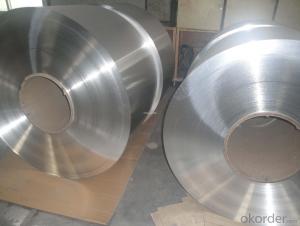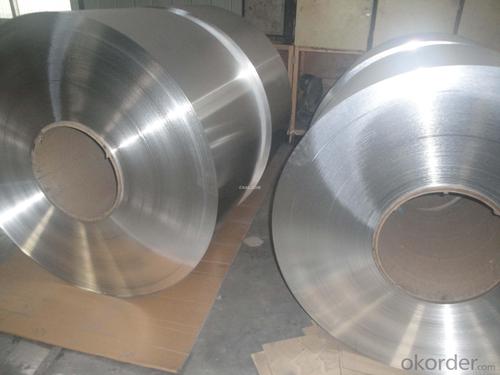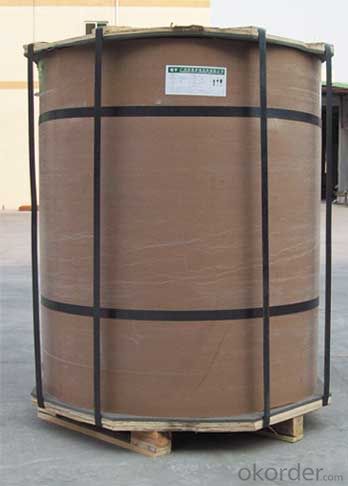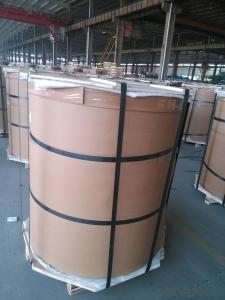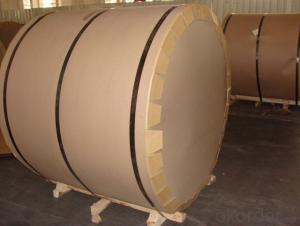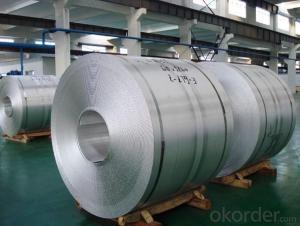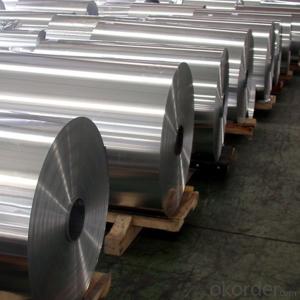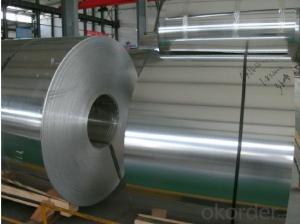Aluminum Coils Inc Tampa - D.C AA3005 Aluminum Coils Used as Building Material
- Loading Port:
- Shanghai
- Payment Terms:
- TT OR LC
- Min Order Qty:
- 5 m.t.
- Supply Capability:
- 10000 m.t./month
OKorder Service Pledge
OKorder Financial Service
You Might Also Like
Specification
1.Structure of D.C AA3005 Aluminum Coils used as Building Material Description
D.C AA3005 Aluminum Coils used as Building Material widly used in decoration field. For the painting, it depends on the using evironment. If you use in the open air, we recommend the PVDF coated aluminium coils. This kind of painting can last 15-20 years. If you use in the room, we recommend PE coated aluminium coils. The price is much more competitive.
Direct Continuous Aluminium Foil Stock in Coil is one semi-finished aluminium material. This strip can be rolled down to aluminium foil.The final thickess can be 5-20 microns. Aluminium foil is soft, ductile and with a silver-white luster which can be widely used in a large scare of fields.
2.Main Features of D.C AA3005 Aluminum Coils used as Building Material
a.Competitive price---We have our own mills and can produce mill finished aluminium coils, so we can control the production cost better.
b.Professional after-sale service---We have more than 15 years exportation experience and you need not worry about the exporation problems.
c.Fast delivery time---We can control the delivery time within 35 days.
3.D.C AA3005 Aluminum Coils used as Building Material Images
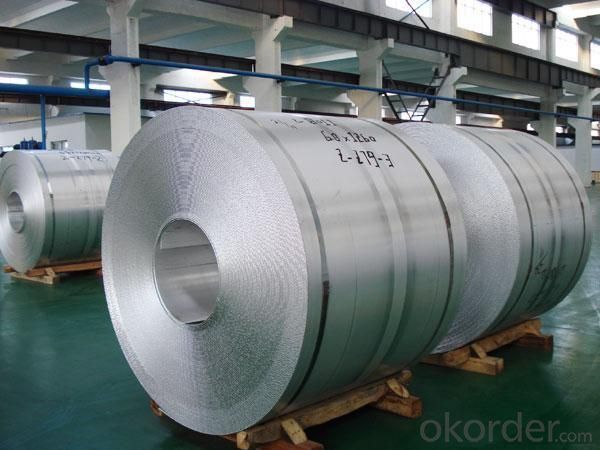
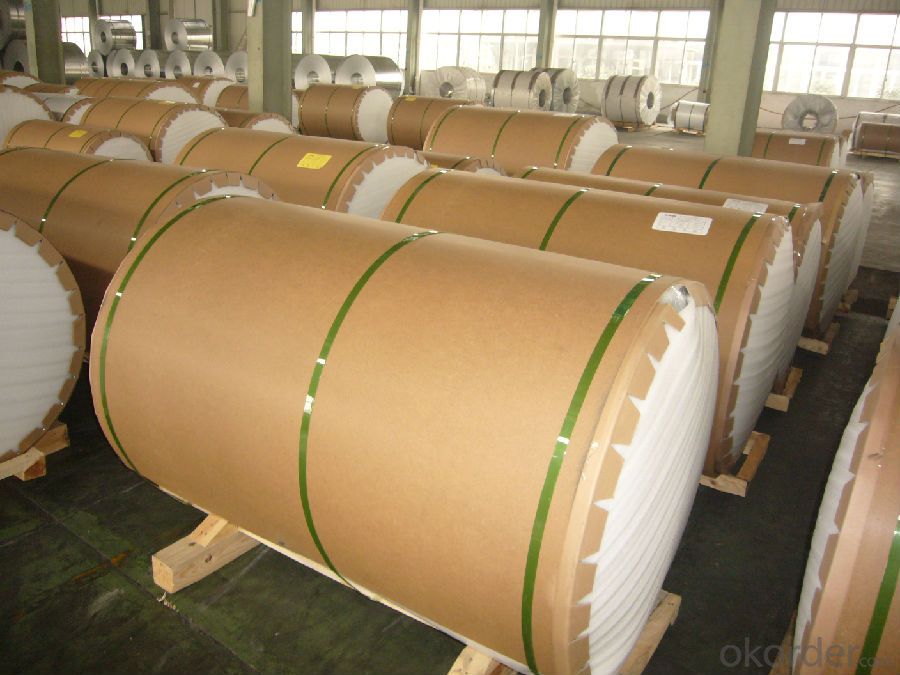
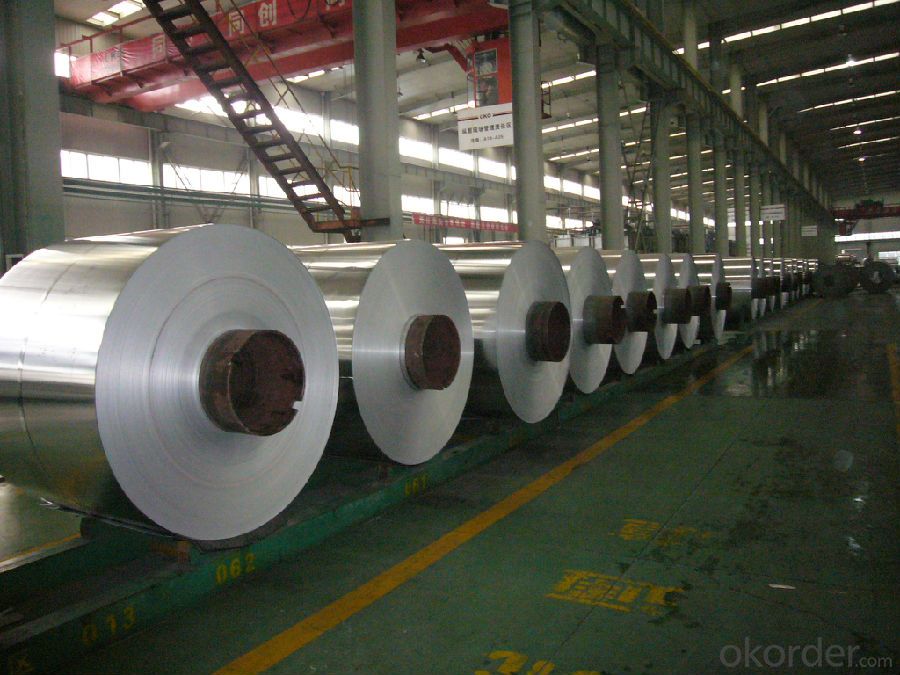
4.D.C AA3005 Aluminum Coils used as Building Material Specification
Alloy | AA3005 |
Temper | H14, H16, H18, H22, H24, H26, H32, O/F |
Thickness | 0.2mm -- 100mm |
Width | 30mm -- 1700mm |
Standard | GB/T 3880-2006,EN |
5. FAQ of D.C AA3005 Aluminum Coils used as Building Material
A.How to guarantee the quality?
Customers are welcome to our mill to visit and check the products. Besides, we can arrange a third party to test D.C AA3005 Aluminum Coils used as Building Material.
B.When will you deliver the products?
D.C AA3005 Aluminum Coils used as Building Material will be delivered within 35 days after receiving advanced payment or original L/C.
- Q: May anyone tell me what's the product when hydrochloric acid reacts with aluminum?HCl + Al → ?
- 2Al + 6HCl - 2AlCl3 + 3H2
- Q: Are aluminum coils suitable for lightweight panel applications?
- Yes, aluminum coils are suitable for lightweight panel applications due to their inherent lightweight nature and high strength-to-weight ratio. Additionally, aluminum coils offer excellent corrosion resistance, making them a reliable choice for various lightweight panel applications.
- Q: What are the different forming processes for aluminum coils?
- Aluminum coils can be formed using various methods. These methods include: 1. The most commonly employed technique for forming aluminum coils is hot rolling. It requires heating the aluminum to a high temperature and then passing it between two large rolls to decrease its thickness. This process enables precise control over the coil's thickness and shape. 2. Cold rolling, a similar process to hot rolling, involves cooling the aluminum to room temperature before rolling it. Cold rolling is often preferred for producing coils with a smoother surface finish and stricter tolerances. 3. Continuous casting involves pouring molten aluminum into a continuous casting machine, which generates an uninterrupted strip of aluminum. The strip is then cooled and coiled to form aluminum coils. Continuous casting is commonly used for large-scale production. 4. Extrusion is a process that entails pushing aluminum through a die to create a particular shape or profile. The extruded aluminum is subsequently cooled and coiled to produce aluminum coils. Extrusion is frequently employed to manufacture coils with intricate shapes or profiles. 5. Slitting is a process used to cut aluminum coils into narrower strips. It involves passing the coil through a set of rotating blades that slice it into multiple smaller strips. Slitting is often utilized to produce coils with specific widths or for further processing. These are just a few examples of the various forming processes available for producing aluminum coils. The selection of a process depends on factors such as the desired shape, thickness, and surface finish of the coil, as well as considerations of production volume and cost.
- Q: Can aluminum coils be used in the production of aluminum composite walls?
- Yes, aluminum coils can be used in the production of aluminum composite walls. Aluminum coils are commonly used as a raw material in the manufacturing process of aluminum composite walls. These coils are typically processed to form flat sheets, which are then bonded to a core material to create the composite panel. The lightweight and durable nature of aluminum make it a suitable choice for constructing high-quality and aesthetically pleasing composite walls.
- Q: Are aluminum coils suitable for outdoor signage?
- Yes, aluminum coils are suitable for outdoor signage. Aluminum is a durable and weather-resistant material that can withstand various outdoor elements, such as rain, sunlight, and temperature changes. It is also lightweight, which makes it easier to install and transport. Additionally, aluminum coils can be easily shaped and formed into different designs, allowing for versatile and eye-catching signage options.
- Q: Do aluminum coils require any special maintenance?
- Aluminum coils, like any other HVAC system components, do require regular maintenance to ensure optimal performance and longevity. While they may not require any specific special maintenance, they still need attention and care to function efficiently. Regular maintenance tasks for aluminum coils include cleaning, inspection, and occasional coil straightening. Cleaning the aluminum coils is crucial to remove dirt, dust, and debris that can accumulate on the surface over time. This buildup can restrict airflow and hinder heat transfer, reducing the overall efficiency of the system. Cleaning can be done using a soft brush or vacuum cleaner, ensuring that the fins and coils are not damaged in the process. Additionally, regular inspection of the aluminum coils is necessary to identify any signs of corrosion, leaks, or damage. Addressing these issues promptly can prevent further deterioration and costly repairs. It is recommended to check for any bent or damaged fins and straighten them if necessary to maintain proper airflow. Furthermore, it is essential to keep the surrounding area free from debris or vegetation that could obstruct airflow and cause the coils to work harder, leading to increased energy consumption and potential compressor damage. Regularly trimming vegetation and keeping the area clean will help maintain the coils' performance. Lastly, it is advisable to have a professional HVAC technician perform annual maintenance on your HVAC system, including the aluminum coils. They can conduct a more thorough inspection, clean the coils with specialized equipment, check refrigerant levels, and ensure the system is operating at its best. In conclusion, while aluminum coils do not require any specific special maintenance, regular cleaning, inspection, and occasional coil straightening are essential to ensure their optimal performance, prevent damage, and extend their lifespan.
- Q: Aluminum inventory of the company, placed for a little longer, there will be surface oxidation, white spot shape, after cleaning into black spots, affecting the use of. Is there a better and convenient way to save it?
- Aluminum coil formation prevents oxidation of aluminum coils.In the aluminum coil chemical treatment to prevent oxidation of the surface of the aluminum layer to prevent corrosion, and increase after coating adhesion and corrosion resistance of the coating, conversion layer appearance color, golden yellow or green blue, the main function in ensuring the consistency of coating and film combination.
- Q: What are the precautions to be taken while handling aluminum coils?
- To ensure safety and prevent potential accidents or damage, there are several precautions that should be taken when dealing with aluminum coils. First and foremost, it is essential to wear the appropriate personal protective equipment (PPE), including gloves, safety goggles, and protective clothing. This gear will help safeguard against cuts, abrasions, and exposure to chemicals. It is also crucial to handle aluminum coils with care to avoid any harm or deformation. Dropping or mishandling the coils can compromise their structural integrity and potentially lead to injuries. Furthermore, one must be mindful of the weight of the coils and employ proper lifting techniques. If the coils are too heavy to lift safely, seeking assistance or utilizing mechanical lifting equipment is imperative to prevent strain or injury. Moreover, aluminum coils should be stored and transported securely and stably. They should be placed on a flat and even surface and adequately secured to prevent any movement or rolling. During transportation, it is essential to ensure that the coils are well protected against potential damage or external forces. In addition, maintaining a clean work area, free from clutter or obstacles that may cause accidents, is of utmost importance. Any spills or leaks should be promptly cleaned up to prevent slips or falls. Lastly, it is crucial to adhere to all safety guidelines and procedures provided by the manufacturer or employer. This includes understanding the specific properties and hazards associated with aluminum coils and following any recommended handling or storage instructions. By following these precautions, individuals can minimize the risk of accidents, injuries, and damage while handling aluminum coils.
- Q: Is it possible to use aluminum coil for creating a sculpture?
- <p>Yes, you can use aluminum coil to make a sculpture. Aluminum is a versatile material known for its strength, lightweight, and malleability, which makes it suitable for sculpting. It can be bent, twisted, and shaped into various forms. When working with aluminum coil, you can use tools like pliers, wire cutters, and a metal bender to manipulate the coil into the desired sculpture shape. Ensure you take safety precautions, such as wearing gloves and eye protection, due to the sharp edges and the risk of injury from handling metal.</p>
- Q: Can aluminum coils be used in the manufacturing of furniture?
- Yes, aluminum coils can be used in the manufacturing of furniture. Aluminum is a lightweight and durable material, making it ideal for furniture production. It is commonly used in the construction of outdoor furniture, as it is resistant to rust and corrosion. Aluminum coils can be formed into various shapes and sizes to create different furniture pieces. Additionally, aluminum can be easily customized and finished with different coatings or paint to match any desired aesthetic. Overall, aluminum coils are a versatile and practical choice for furniture manufacturing.
Send your message to us
Aluminum Coils Inc Tampa - D.C AA3005 Aluminum Coils Used as Building Material
- Loading Port:
- Shanghai
- Payment Terms:
- TT OR LC
- Min Order Qty:
- 5 m.t.
- Supply Capability:
- 10000 m.t./month
OKorder Service Pledge
OKorder Financial Service
Similar products
Hot products
Hot Searches
Related keywords
